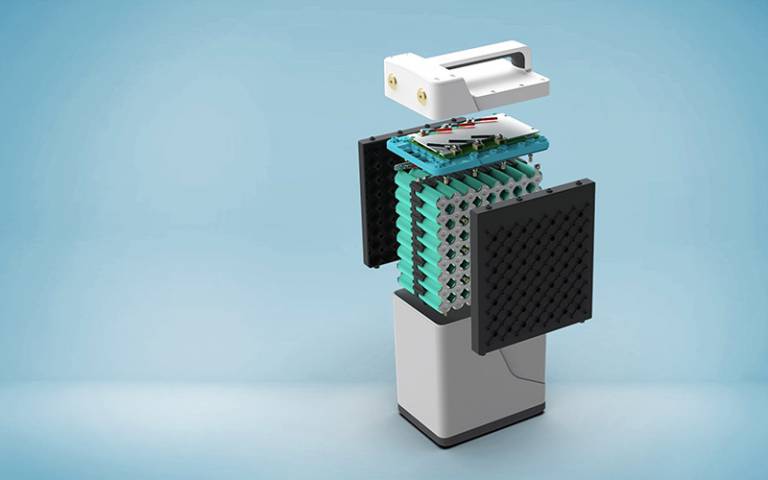UCL partners with battery company Aceleron to make electric cars even greener
10 November 2021
As the UK hosts the world’s most significant summit on climate change, UCL announces a new partnership to help Aceleron lead the way in sustainability.

UCL is working with battery manufacturers Aceleron on a sustainability-focused knowledge transfer partnership (KTP). The project will enable the business to tap into the latest sustainability expertise at the university, to optimise their recyclable battery technology for electric vehicles.
The KTP initiative provides the funding and support for organisations to join forces with an academic team, to develop a new product, process, service or efficiency saving.
The project is worth over £200,000.
Helping Aceleron reduce battery waste in electric vehicles
Aceleron is an award-winning battery technology company based in the West Midlands.
The company started when the co-founders dismantled and tested hundreds of battery packs and realised that the batteries weren’t designed to be maintained or recycled. Anticipating a future with tonnes of unnecessary battery waste, they developed the world’s most sustainable lithium batteries, which can be serviced, upgraded and recycled.
In their KTP with UCL, they’re now looking to improve the way their batteries work for electric vehicles, a huge potential market for their products.
Professor Dan Brett (Professor of Electrochemical Engineering), from UCL’s Department of Chemical Engineering, is the lead academic on the project, with Dr James Robinson (Senior Research Fellow).
Dan explains: “Battery waste from the electric vehicle market is projected to be 22 million tonnes a year by 2040. Aceleron are tackling this problem with sustainable lithium battery packs. But because of the way these are made, using mechanical compression rather than glue, there's scope to optimise the design, increasing the lifetime and power possible from the batteries. Our researchers will be working with Aceleron to build on existing technologies and develop better performing batteries for electric vehicles.
“From our perspective, the project is hugely exciting. We get to translate fundamental research from the lab to an industrial project, and integrate sector-changing work with a British SME into our teaching.”
Tapping into UCL’s specialist expertise
The KTP project will allow Aceleron to tap into specialist expertise from UCL’s Electrochemical Innovation Lab (EIL), the largest electrochemical research lab in the UK.
The company will be drawing on the latest insights from UCL research, specifically relating to the contact resistance of batteries. Contact resistance is the wear and tear that happens when the different parts of the batteries are held together using compression, and can cause degradation.
Aceleron will be working with UCL to develop specialist coatings for their batteries, to prolong their life and power. The batteries will be designed for reuse, creating a circular economy for the sector and reducing overall emissions and battery waste associated with electric vehicles.
Carlton Cummins, Chief Technology Officer and co-founder of Aceleron, says: “Using UCL’s vast expertise in contact resistance, we’ll be working to develop recyclable batteries that deliver higher power, degrade less and last longer, mitigating the contact resistance issue that has yet to be addressed by the large manufacturers. It’s a huge market opportunity for us, and should go a long way towards reducing waste and emissions in electric vehicles, so there’s a lot to be gained.”
Kathryn Walsh, Executive Director at UCL Innovation & Enterprise, says: “This significant new KTP project highlights UCL’s continued commitment to tackling sustainability challenges. With COP26 taking place this month, the project underlines the vital importance of harnessing university research to address environmental issues, as we move into this new era of positive climate action.”
Knowledge Transfer Partnerships
Knowledge Transfer Partnerships (KTPs) aim to help businesses improve their competitiveness and productivity through better use of the knowledge, technology and skills held within the UK knowledge base. These KTP projects are being funded by UKRI through Innovate UK.
Links
Find out more about:
- Aceleron
- UCL Climate Hub: a community for change
- UCL Chemical Engineering
- Growing your business through a Knowledge Transfer Partnership (KTP)
- Working with businesses on a KTP (information for UCL staff)
- Professor Dan Brett
- DesignBuilder and UCL KTP on building performance assessment and modelling
Photo © Aceleron Ltd.
 Close
Close

